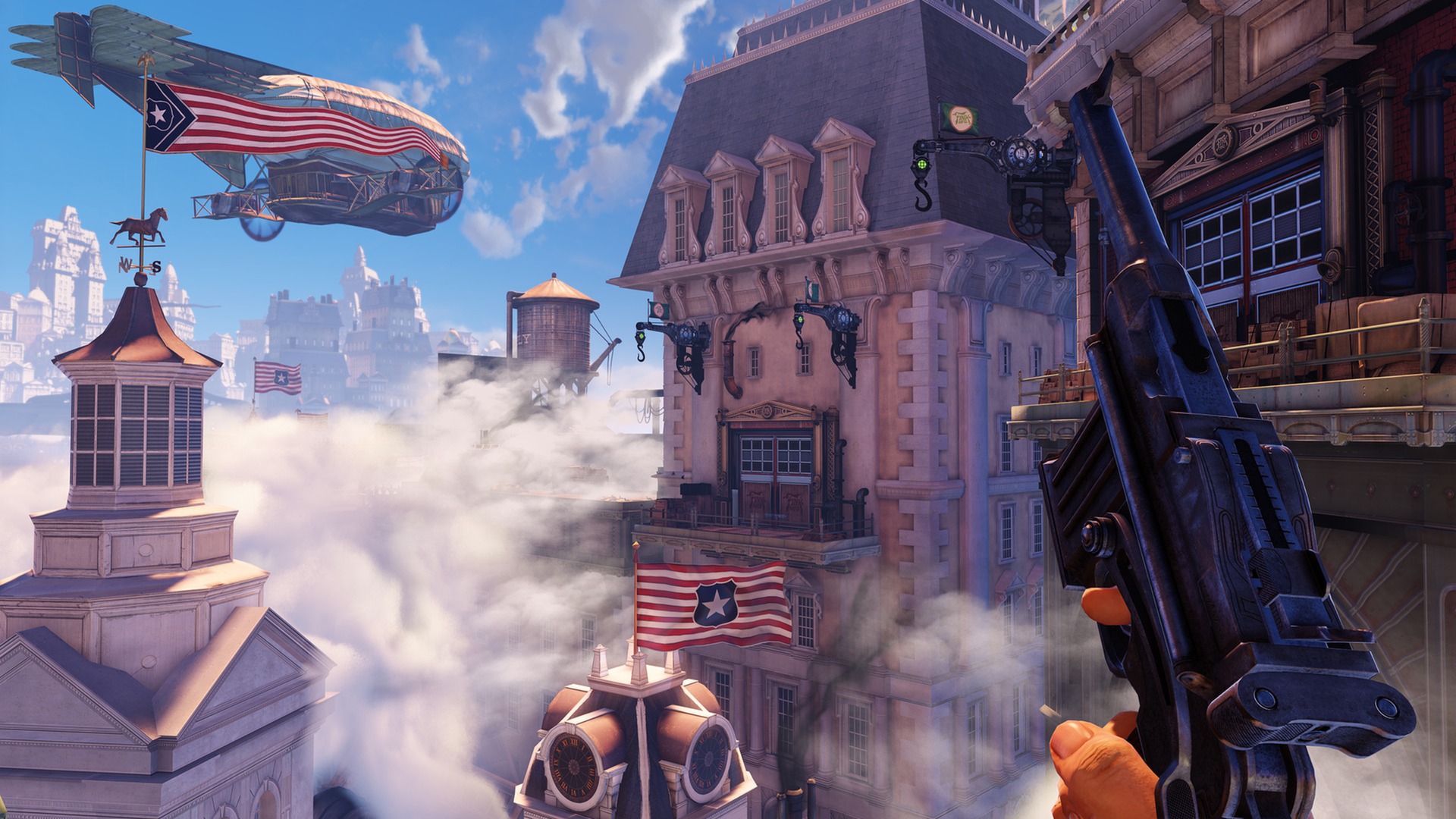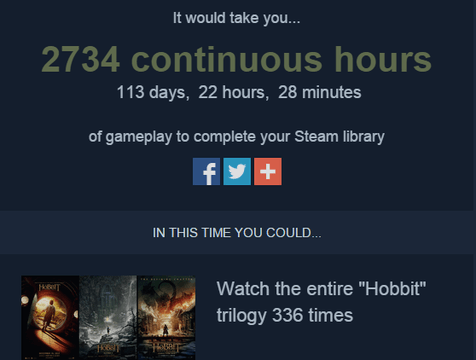Watching The Hobbit trilogy 336 times looks pretty good right now.
I know I can’t be the only person who has a plethora of games they’ve never finished. In some cases, I’m nowhere near finishing them. I have two categories for my games on Steam “Completed” and “Want to Finish” (the latter growing at a consistent rate). These days I honestly prefer shorter games that are maximum 8 hours, than RPGs that take 40+ hours just to finish the main storyline.
Games that end up being my personal Game of the Year are the ones I keep going back to, bar the occasional visits to WoW and the ever-present FIFA career modes. I’m talking about the games I have to leave to go to work, and the time I’m there waiting to get home and play more of it, those are the games I tend to finish.
Last year for me that was Dark Souls 2. 53 hours spent on Dark Souls 2 and I oddly enjoyed every last-minute of it (well except maybe the hours spent dying to The Rotten). Mechanically, it is quite a simple game but its setting was intriguing and that drive to kill each boss reminded me of good-old raiding in WoW.
The year before that was Bioshock: Infinite, which I adored for its art design, characters, and story, a game that had me gripped from start to finish. I even played through its DLC, which is a rare thing for me.

But what about all those other unfinished games I have? Why can’t I complete those? Usually, that’s not the question. The question is “What aspects of this game deter me from the desire to finish it?” I occasionally lose the desire or drive to finish a game because there’s one or more aspect/s I have issues with. What are those issues? Let’s find out.
Time
Fortunately for me, I tend to have plenty of time to finish games, but recognize that the main factor for most gamers when it comes to finishing games is that they don’t have the time. Maybe you’re busy at work or have exams to focus on. When a developer says their game will take 40 hours just to complete the main story my first thought is “Urgh, I’m never going to complete that!”
Many gamers buy their games when they’re on sale, knowing they won’t have time to play it immediately. This causes many games to go on the back-burner, they sit there with every intention of being played and completed but right now just isn’t the best time.
The Initial Slog
A phrase that seems more prominent in recent years goes something like this (and stop me if you’ve heard this one before): “about 6 hours in it gets good.” Or in the case of Dragon Age: Inquisition: “so the game gets good at around 15 hours.”
Am I the only person bothered about this?
The idea of having to plow your way through 15 hours of content before you can start enjoying the game just seems odd. I understand doing tutorials and setting up the story at the beginning, but some games do that infinitely better than others.
A lot of games seem to have this initial slog. This period where you’re waiting for the game to open up and “get good.” It’s definitely an issue in open world games, you wait for the moment the world becomes open and lets you off the leash with a distinct feeling of: “See all this, this is your playground now, off you go.” Like Watch Dogs for example, or any of the Assassin’s Creed franchise. Assassin’s Creed III has a terrible ‘initial slog’ as you play a Templar, Haytham Kenway, for the first 3 ‘sequences’ of the game. This part of the game leaves a lot to be desired, and it’s awhile before you can play the central character.

Uninteresting Characters
Sticking with Assassin’s Creed III, Haytham Kenway – the Templar you play as – was an extremely unlikeable and uninteresting character. After a few hours, I didn’t care about anything I was doing, who my character was or anyone around me. Later on, Haytham Kenway becomes important to the main story but at that point you’re playing Connor (Blandy McBlandison). The saving grace of a compelling character in Assassin’s Creed III was Achilles Davenport, but he just wasn’t enough to have me invested in Blandy McBlandison. Can you tell I don’t like Assassin’s Creed III yet?
My main issue with uninteresting characters in more story-driven games is you need to invest time and effort into these characters that you just don’t care about. Choices you’re given in the game, your character’s backstory just becomes tedious (made even worse if you can’t skip cutscenes). Then the inevitable “I don’t care!” shouting at the screen begins.
Games where the characters I’m spending time with are interesting
I’ll give three examples and, believe me, there are many more. In Bioshock: Infinite, I felt all the main characters were extremely interesting. Elizabeth the most of all (from the first moment she does ‘that thing’ to the Paris painting). Booker, Comstock, and Daisy Fitzroy were also all engaging, and I wanted to learn more about throughout the story.
The Witcher 3: Wild Hunt has a strong cast of characters surrounding the main character Geralt. The more you learn about Ciri, and Geralt’s determination to find her, the more you become invested in actively finding her. With the help of characters like Yennefer, Triss, and Zoltan the game continues to impress me with how much depth the characters have.
Gone Home plays out with Kaitlin (the player) trying to discover what has happened to her family after she’s returned home from Europe to find her home empty. There are various clues and notes littered around the house that shed light on Kaitlin’s sister Samantha as well as the rest of her family. I don’t want to give too much away, but the game adds extra layers to each character as the story progresses.
Uninteresting Story
It’s self-explanatory that story-driven games must have a good story. This can tie in with having great characters because the effects are the same. If the story is uninteresting, I don’t care about what is going on. Exposition can be a killer here, a game can start with exposition. Yet it can fill in gaps in the story, that sometimes aren’t necessary.
Years and years ago the flingdy flong fought the flangdy flung and the battle lasted for centuries, but it was a young boy whom ended the war. Zzzzz.
Now I’m not flat-out saying if the story is bad I will not finish the game. It’s a factor yes, but games like Dark Souls II, which at face value don’t really have a story are still great games to play that come with a drive to complete it. Interesting mechanics and setting can vastly deter you from paying too much attention to the story (or lack of).
The FPS genre tends to have terrible stories in the campaigns, but then again they’re not often advertised as “story-driven” games. The Call of Duty and Battlefield series, for example, are marketed as online multiplayer shooters, but it doesn’t really excuse them for their dreadful campaigns. Something that Battlefield: Hardline tried to change with it’s TV show-esque presentation with its campaign.
Dying Light as well didn’t have a story that drove me to fight off zombies. I was undercover or something? I kept having to go on a roof with a radio for some reason. I didn’t really care what was going on. On top of that, Dying Light had very few characters worth any emotional investment.
Gameplay
This is one that can just put all the others to the side. If the game is an absolute joy to play, you kind of ignore the other stuff when it comes to any kind of campaign or story modes. Again, as mentioned, Dark Souls II is an example here. It was really fun to play, the lack of story didn’t bother me as much.
On the other hand, a game can feel like a chore if its gameplay isn’t good. Murdered: Soul Suspect had an interesting concept behind it, but the execution on the gameplay didn’t live up to other aspects. Any section with the Demons felt extremely forced to add some depth to it’s already sparse gameplay. If it had more depth to its investigations and less focus on very weak combat Murdered: Soul Suspect it could have been a better game.
“Walking Simulators”
We all know about “Walking Simulators.” I tend to enjoy those a lot more than other people might, if the story is good. They are interesting ‘games’ that continue to split opinion over their lack of gameplay (hence the name). The fact “Walking Simulators” are usually short, meaning I’m more likely to finish them.
Most will allow you to pick up objects important to the story and help you uncover more of what’s going on, like Gone Home or Ether One. If you miss items, you could miss some extra hidden story the game has to offer. Others, like Dear Esther, are levels of nothing, a slightly interactive experience but not a game. You can’t pick up or do anything, you just walk from A to B and the credits roll.
For PC – I just want the game to work
With the recent disastrous PC release of Batman: Arkham Knight – which is the platform I had the displeasure to purchase it on – I was reminded me of games I bought on PC that ran so poorly I just couldn’t be bothered with it. Even after patches, all I associate these games with is how badly they ran on PC. “Watch Dogs? Oh yeah that game ran terribly””Dying Light? Oh I had AMD hardware at that time, it was unplayable.”
PC gets it hard sometimes with console ports, but when a game like Witcher 3 runs as well as it does you look at other developers and ask: Why can’t you do that? In some cases, as recently reported on Arkham Knight, it’s because these developers and publishers think it’s acceptable and they can get away with it. With Steam Refund allowing consumers to speak with their wallet, I hope broken PC ports will be less common.
In story-driven games, especially longer ones, it gradually becomes harder to keep me interested in finishing. Certain aspects like the story, characters, settings, and mechanics can reach a certain point where I get too frustrated with them. I then might realise I’d rather be playing something else, something that I want to keep playing because I don’t have a problem with these aspects. Unfortunately, it happens too often, that “Want to Finish” list will just continue to grow.
What about you? Why don’t you finish certain games?
http://steamleft.com/







Published: Jul 2, 2015 07:32 am